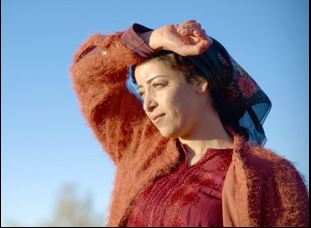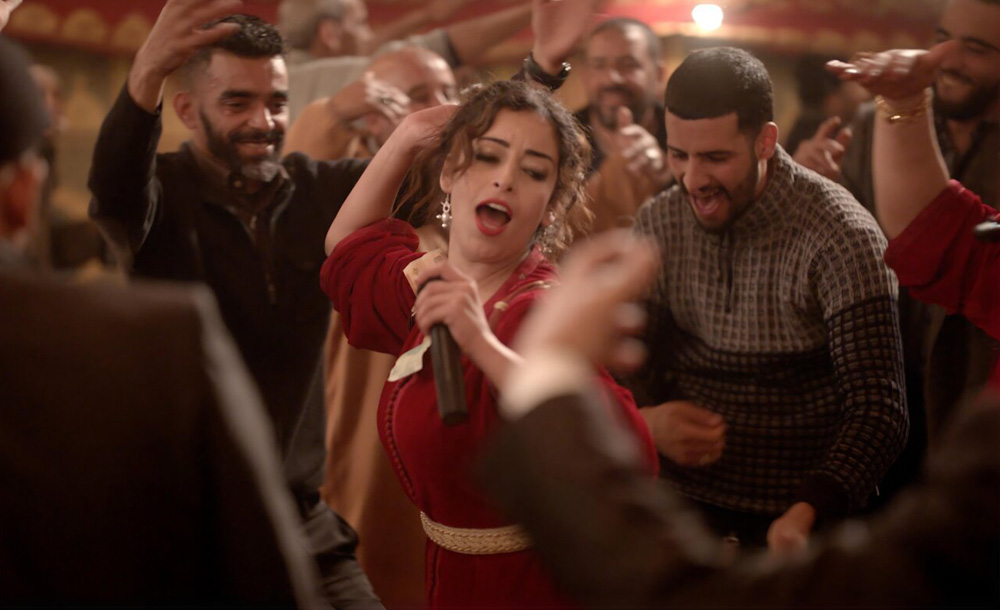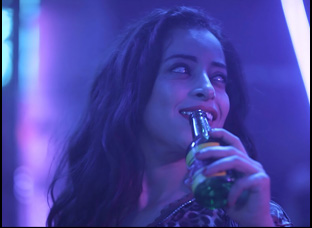There have always been a limited number of Aita, the songs sung throughout the history of Morocco that have become an oral tradition in the country, with female performers known as Sheikhas bringing others to their feet with the music that contained all the emotion of their ancestors with its aching beauty and sensuality.
“Since the 19th and beginning of the 20th century, nobody came with new aita,” says Nabil Ayouch, who wouldn’t dare trying to pen a new one when it was in part how the 22 songs in existence became richer over time that would lead him to make his latest film “Everybody Loves Touda.” “This is locked. It is a heritage that you cannot touch.”
Still, the director, who has firmly established himself as one of the great storytellers of his homeland with films such as “Horses of God” and “Casablanca Beats” that have had an eye towards a better future while reflecting a history that has a way of holding people back, wanted to honor the Sheikha who have been carrying the torch for years and have come under scrutiny in more conservative times for Morocco when the skin-baring outfits and candid lyrics that have been part of the practice for centuries was suddenly seen as amoral. With “Everybody Loves Touda,” he’s ensured their music has reverberations well beyond Marrakesh as it follows Touda (Nisrin Erradi), a single mother to a deaf child who plays cabarets at night to support his education as much as she sings for herself, being one of the few Aita practitioners left in a inhospitable environment.
With a strikingly soulful turn from Erradi that’s as stirring when she’s sitting down to contemplate the road ahead as much as when Touda is pouring out her heart on stage, the film reflects a time-old conundrum for women in general with a fresh perspective when Touda’s independence is seen in a male-dominated society only as being indicative of sexual promiscuity, receiving unwanted attention for her performances while feeling a duty to carry on the tradition of the music of resistance when it is a cause bigger than herself. Once again writing with his partner Maryam Touzani (“Adam,” “The Blue Caftan”), Ayouch gives the intimate story the scale it deserves, filming across four seasons and tracking Touda from the countryside to the city with the same level of elegance as the singer expresses herself in her music, with the film’s dazzling climax unfolding in a single take as she ascends one of the tallest buildings in Casablanca.
After taking audiences’ breath away at its premiere at Cannes earlier this year, the film was selected as Morocco’s official entry to this year’s Oscars and on the eve of a special screening tonight at the American Cinematheque’s Los Feliz 3 in Los Angeles, Ayouch spoke about the commitment required both from himself and his star Erradi to do justice to the artistry and perseverance of Sheikhas, structuring a shoot over the course of a year and pulling off that jaw dropping final scene.
If you’ve seen some of my previous movies like “Horses of God” or “Razzia,” there was always this passion for these women, the Sheikha. I’ve always been very intrigued by how important the part that they play in the society and the power that they have not only towards men, but also towards women and how they carry this heritage because a Sheikha in Morocco is not something that is neutral. When you say the word, you wake up a kind of mythology. Everybody knows what a Sheikha is. Everybody loves their music, and everybody loves them and hates them at the same time and I’ve always said to myself that this kind of paradox would be the main topic for one of my movies.
You’ve got an incredible lead actress in Nisreen. At what point did she enter your mind to play this character?
I met Nisreen 15 years ago when she was still a student at the Academy of Acting in Rabat. She was part of a TV series that I produced at that time, and I remember me going on the set one day and watching her, playing a part in this TV series and saying to my team, “Wow, who’s that? Where does she come from? She’s huge.” At that time she was only 20, and I’d seen her in “Adam” that my wife Maryam [Touzani directed], and immediately when I came up the idea of a film about the the Sheikha, we decided it would be for her. So the usual time that we spend looking for the actor or the actress was spared and used [instead] for preparation. She was not only inspired and trained by Sheikha, but she lived with them and the richness of the approach in the film comes from this experience that Nisreen had and observations and discussions that also I had with them.
I sent [Nisreen] to Asfi, a city down near Marrakesh, to spend time there, to live with them, to experience the-the life that they live, and to not only learn how to sing, how to dance, how to play the rhythm on the taarija [drum], but also how to speak [like them] and the attitude. She told me about that every day, like “look what I’ve learned, and how they talk between each other, and the codes that they use” and in the meantime, I had lots of discussions with some of those main Sheikhas. Khadija al-Badawiyah, one of the major last Sheikhas in Morocco, died unfortunately during shooting.
You seem to have made great use of time throughout when it’s impossible nowadays to schedule a shoot across four seasons, but you’re able to pull it off. How did you figure this out?
For some reason, it was very important for me not to shoot the film in one piece, but the relationship to the seasons is that they’re very marked in Morocco. You can feel the winter, you can feel the summer, and the transformation of the nature around [the character] was important for me because nature is part of the beautiful things that emerge in Touda’s life. At the very beginning, I asked Nisreen if she would accept being on this project for a year-and-a-half and she told me, “Nabil, yes, because I do understand how important it is for you and how important it is for the part.” And I told her, “In between those four phases of shooting,” you can, of course, do something else — another movie or a TV series, I would totally understand.” And she told me, “No, I’m jumping into this character and I will stay with this character until the end of the project.” And that’s what she did. Afterwards, she told me, “ Even if I had said yes [to other roles], I would have been totally incapable to do that. I was totally dedicated to this part.” And after she finished the film, she took a long time to get out from the part. But it was thanks to her that I could reach that process, and the dedication of all the team and the producers. I really wanted to take my time during this film.

We just had lots of repetition, and that’s also why I wanted to take my time because it’s a very visual and choreographed way of shooting. There’s a lot of mise-en-scene in certain scenes that sometimes was a bit hard to adjust to, but the cinematographer [Virginie Surdej] has worked with me for ten years now. It’s our fourth movie together and she also worked on “Adam” and “The Blue Caftan,” so we have a strong complicity together.
Is it true the final scene took three months to plan for? It’s a breathtaking finale when you track Touda through a high-rise in a single take.
Yeah, the problem of this shot began the day I wrote the scene. [laughs] I knew it would be very, very difficult for me to consider that scene to be shot in [multiple] shots, so I wrote it [as a single take] and [the ideal was] that this would be possible to do it, but of course I was absolutely uncertain at that time. So we took a lot of months to work on that shot in terms of its technicalities with Kevin, the steadicam [operator], and Nassim, the sound engineer, and all the team to see if there would be a way to begin a shot on the door of a taxi and do all this [filming] up to the the 30th floor and then go back down for eight minutes. Everybody told me “This is absolutely impossible. Even if it was an American movie with lots of means, we would have said it’s impossible because there’s no way we can do that in terms of transmission with the signals.”
Then I had to convince them by explaining that if I would cut the emotion of the actress during that scene, his rise and fall, I would lose all the reason why I wanted to do the film, so this was the only possible way. I was not looking for a technical [feat]. I don’t care about that. It was something that when you are the only one to believe in something, then you have to convince hundreds of people that it’s possible and finally, we made it. And we made it last minute because we had to shoot that shot after three months of preparation in one night. We began at noon and then we spent six to seven hours to prepare it again — what we had already prepared for three months — and when we begin the shooting, we reached that scene at 6 am in the morning.
That’s probably the most crazy thing that I’ve done in my life. It paid off immensely. What’s it been like to see the film connect with audiences?
It’s been a wonderful journey since Cannes and the most moving moment for me was in Angoulême Film Festival, one of the major film festivals in France. We had to premiere the film to the audience in a multiplex that has 13 theaters and when I arrived there, the festival told me, “We have news for you. All the 13 theaters have been booked for the film, so you’re going to have to introduce it in each theater in 45 minutes. Can you do that?” I said, “Let’s try. I’ve never done that.” But I felt that day that the audience was very engaged with what the film was talking about. It was not only about the topic of those women [the Sheikha] and what they experienced. Those women were talking to some other topics that women are experiencing today and [the film felt it] could be shared worldwide.
“Everybody Loves Touda” will be screening in Los Angeles on November 14th at the Los Feliz 3 in a double bill with “Murderess,” starting at 7 pm.





